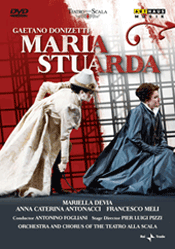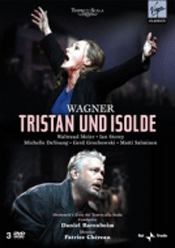In Maria Stuarda most of the best music and arguably all of the drama takes place in the first half of Giuseppe Bardari’s adaptation of Friedrich Schiller’s play. After Maria loses her cool and defiantly slanders Queen Elizabeth, act two becomes a somber dirge as Maria’s inevitable execution grows closer. To make the evening worthwhile, that first half has to be delivered by committed, top-notch artists unafraid of bold emoting (OK, overacting). And that’s what we get here from the mature but still exciting Mariella Devia as Maria and the brilliant, courageous work of Anna Caterina Antonacci as Elizabeth.
 Pier Luigi Pizzi’s concept follows the “modern set/traditional costumes” route of contemporary opera production. It’s an effective gambit, avoiding the delays inherent in the scene changes of most traditional productions, and yet giving the audience something familiar and appealing to look at. The fairly clever set up begins with Elizabeth’s first scene resembling a prison, suggesting the confined emotions of the bitter Queen, as the opera portrays her. But when the scene shifts to Maria Stuarda, who actually is imprisoned, we find her outside, in a lovely grove. Once Elizabeth appears on the scene, the grove descends from view and the grim backdrop of cage walls reappears. This gets the maximum impact out of the minimum of stage design.
Pier Luigi Pizzi’s concept follows the “modern set/traditional costumes” route of contemporary opera production. It’s an effective gambit, avoiding the delays inherent in the scene changes of most traditional productions, and yet giving the audience something familiar and appealing to look at. The fairly clever set up begins with Elizabeth’s first scene resembling a prison, suggesting the confined emotions of the bitter Queen, as the opera portrays her. But when the scene shifts to Maria Stuarda, who actually is imprisoned, we find her outside, in a lovely grove. Once Elizabeth appears on the scene, the grove descends from view and the grim backdrop of cage walls reappears. This gets the maximum impact out of the minimum of stage design.
The focus here remains on the performers, and they deliver. Made-up to make her attractive self as unattractive as possible, Anna Caterina Antonacci uses the steely edge to her voice effectively, and her tightly wound fury at Maria Stuarda’s refusal to acknowledge Elizabeth’s power and authority helps to strengthen Mariella Devia’s portrayal, which isn’t as imaginative as acting. Devia takes a while to warm up, and even late in the evening her pitch strikes your reviewer’s ears as just a bit off too often. Nonetheless, she has total command of the music’s idiom, and her technical displays are enthralling, certainly capturing the love of a besotted La Scala audience. It’s not the singer’s fault that in act two Donizetti’s score asks her a few too many times to rise to a climatic high note, to less and less effect, even though Devia delivers some good ones.
The males in this opera are satellites in the orbit of these two women, but Simone Alberghini makes his Talbot a somber but warm presence by means of his dark, steady instrument. Francesco Meli takes on the tenor role, which is dramatically inert but features some challenging music. Though not a matinee idol, Meli looks presentable enough to make a romantic interest on both women’s part understandable. His voice, while not particularly distinctive, manages the score’s challenges with admirable facility. Conductor Antonino Fogliani, a new name to your reviewer, makes a very positive impression, managing the fluid tempos and dynamic shifts that keep the score fresh.
Carlo Tagliabue’s TV direction is acceptable except for the act one finale, where frenetic editing lessens rather increases the excitement. ArtHaus Music appends a model bonus feature in the familiar form of the backstage documentary. At only 12 minutes, it captures a real sense of that frantic environment, while still including some thoughtful comments from the artists. Unfortunately, the translator of the booklet essay into English, High Keith, must have been rushed. What else could explain the fractured syntax in places? But Keith deserves no blame for the bland pronouncements on the historical figures. The last paragraph on the opera’s performing history would have been sufficient.
The booklet for Virgin Classics release of Tristan und Isolde, recorded at La Scala in December 2007, has no track listing and only minimal credits. Other than presenting some high-quality photographs - not exactly essential when accompanying DVDs - the booklet exists to share Patrice Cherau’s notes, which are alternately - sometimes even simultaneously - fascinating, dopey, insightful and banal. The various section headings give some clue as to their content: “The death drive,” “Two different people,” “Sexual desire,” “The corridor to death.” Chereau might have been better off just letting his work speak for itself, for his direction of this production, along with the magnificent conducting of the La Scala orchestra by Daniel Barenboim - make this an essential viewing experience.
Isolde and Brangäne are caught in a very masculine world, a bare platform before a stony facade that somehow manages to be both a sea vessel and the two castle locations of the latter acts. In acts one and three, the leads are never really alone. Sailors work behind the singers in act one, and in act three, the mortally wounded Tristan has a small group of his men around him, waiting for him to regain consciousness. The grim set (by Richard Peduzzi) risks the tedium of visual monotony, but Chereau’s ability to keep the stage picture fluid and energized obviates the risk. Moidele Bickel’s costumes feature almost no color, either, except for a bold red robe for Isolde in act two. Somehow, the production still deserves to be called “vivid,” for such is the heart-pounding inspiration of the performances.
Two of the stars have made their roles key parts of their repertoire. Waltraud Meier recorded her Isolde with Barenboim some years ago. She will never be the ideal Isolde vocally for many listeners, as her top narrows to a copper wire intensity, and she is often less concerned with accuracy of pitch than evocation of mood. But as a total performance, Meier’s Isolde on this night recorded here encompasses more of the role than most any other singer has captured: the rage, the mysticism, the sensuality. Towering over most of the cast (only Ian Storey’s Tristan comes close in height), Matti Salminen’s King Marke makes his late appearances in each act imposing and even threatening, both physically and vocally. This is a sad man, but with an edge of physical violence, as he manhandles those, like Melot, who have brought him face to face with a reality he did not want to see.
Supposedly Barenboim personally selected Ian Storey for this, the singer’s first go at Tristan. He certainly looks more like a Tristan than most other singers, with a handsome, silver-haired head and a tall, strong physique. Vocally he seems right at the edge of his resources almost all night, but he makes it through, and the totality of her performance is quite affecting. Made up to look older and plainer than she is, Michelle DeYoung’s Brangäne helps Meier’s Isolde to look younger and even more beautiful than she is. Their voices, however, bear a bit too much of a resemblance to each other, including a proclivity on DeYoung’s part for wiry, intonation-challenged top notes. Gerd Grochowski’s Kurwenal is a slender, wild-eyed mascot to Storey’s Isolde, with an obsessive love for his master. The voice is far from handsome but matches this characterization well.
Patrizia Carmine’s TV direction opts occasionally for some cheesy dissolve effects. Each of the acts gets its own disc, with curtain calls included, which are, understandably, quite lengthy at the end of the evening. Your reviewer appreciates the inclusion; others might wish to see a two disc-set with a lower price. The Maria Stuarda has little competition on DVD. There are many strong versions of Tristan und Isolde available, including an earlier Barenboim-led effort filmed at Bayreuth which is excellent. Anyone seriously interested in opera performance today should still want to view both of these titles.
Chris Mullins

